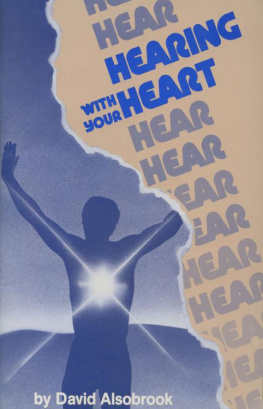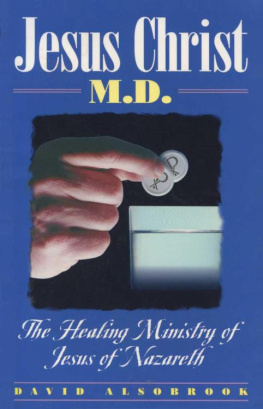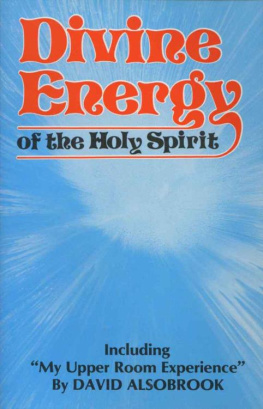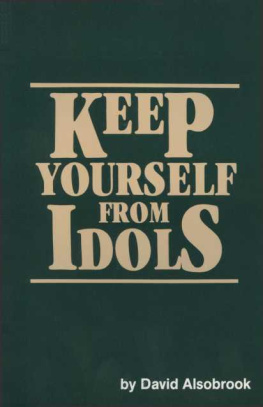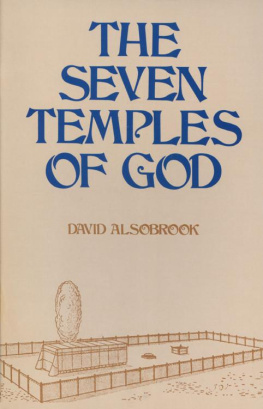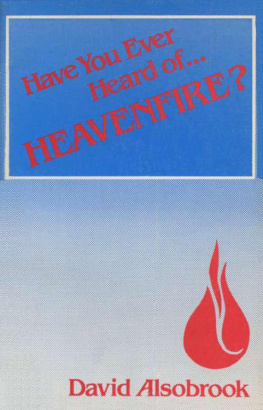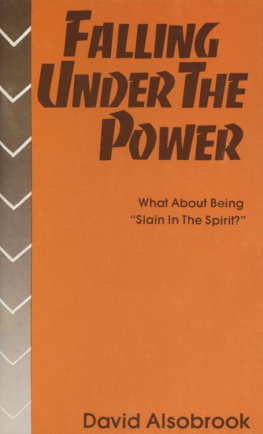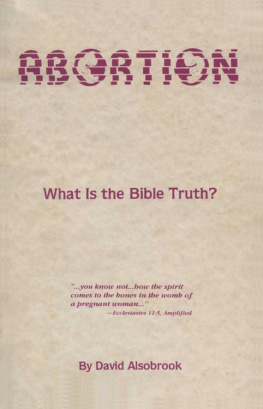David Alsobrook - Hearing With Your Heart
Here you can read online David Alsobrook - Hearing With Your Heart full text of the book (entire story) in english for free. Download pdf and epub, get meaning, cover and reviews about this ebook. publisher: David Alsobrook Ministries, genre: Religion. Description of the work, (preface) as well as reviews are available. Best literature library LitArk.com created for fans of good reading and offers a wide selection of genres:
Romance novel
Science fiction
Adventure
Detective
Science
History
Home and family
Prose
Art
Politics
Computer
Non-fiction
Religion
Business
Children
Humor
Choose a favorite category and find really read worthwhile books. Enjoy immersion in the world of imagination, feel the emotions of the characters or learn something new for yourself, make an fascinating discovery.
- Book:Hearing With Your Heart
- Author:
- Publisher:David Alsobrook Ministries
- Genre:
- Rating:4 / 5
- Favourites:Add to favourites
- Your mark:
- 80
- 1
- 2
- 3
- 4
- 5
Hearing With Your Heart: summary, description and annotation
We offer to read an annotation, description, summary or preface (depends on what the author of the book "Hearing With Your Heart" wrote himself). If you haven't found the necessary information about the book — write in the comments, we will try to find it.
Hearing With Your Heart — read online for free the complete book (whole text) full work
Below is the text of the book, divided by pages. System saving the place of the last page read, allows you to conveniently read the book "Hearing With Your Heart" online for free, without having to search again every time where you left off. Put a bookmark, and you can go to the page where you finished reading at any time.
Font size:
Interval:
Bookmark:
Hearing With Your Heart
by David Alsobrook
1 My Sheep Hear My Voice
2 If You Will Hear His Voice
3 Hearing Aids
"My Sheep hear My voice..." (John 10:27)
My Sheep Hear My Voice
As a boy growing up in a parsonage I learned quite early what preachers are like "out of the pulpit" (as the common saying goes).
Dad was a sincere, hard working pastor, who tried to live what he believed, but some of his guest evangelists were a different story! As a child I was shocked at the hardness, indifference, and professional performance attitudes which were often displayed by the more well-known evangelists of our denomination.
Nowadays I think back about the "professionalism" that so repulsed me as a boy whenever I encounter other evangelists, prophets, and teachers who privately brag about their "program" in an effort to impress me about their ministries. By the grace of God I have been able to steer clear of these same mistakes in the ministry, but I have had to deal with another area of my life in which "professionalism" had achieved a subtle foothold.
I want to share this with you so you can avoid the ditch I fell into over a long period of time. There is just as much danger in your becoming a "professional Christian" as there is for any preacher to become an actor. There is a singular pitfall that we both must avoid: the error of not hearing God's daily voice!
"Wherefore (as the Holy Ghost saith, Today if ye will hear His voice, Harden not your hearts..." (Hebrews 3:7).
"See that ye refuse not Him that speaketh. For if they escaped not who refused Him that spake on earth, much more shall not we escape, if we turn away from Him that speaketh from heaven" (Hebrews 12:25).
I have noticed some real dangers in recent years as I travel the nation from corner to corner. One of them is the current wave that we can only, or chiefly, hear from God through others.
This bizarre concept has invented a religious phraseology to accompany it; a phraseology which is found nowhere in Scripture!
The use of these phrases substitutes for plainly saying "the word of the Lord came unto me", "the Spirit bears witness" or "thus saith the Lord." Yet, by employing this "lingo" one is perceived as being spiritually minded.
Religious jargon catches on quickly and soon we are unconsciously adopting such phrases ourselves. Here's a few of them:
"I feel (or sense) in my spirit..."
"I feel (or am) impressed..."
"It seems to me that..."
The Bible says in over a hundred instances that God spoke to someone and they knew He had. The closest any of this comes to the Word of God is Paul's admission, "I had no rest in my spirit", but the reason given was "because I found not Titus my brother" (2 Corinthians 2:13).
Why are most Spirit filled believers hesitant to say, "the Lord spoke to me"? Here's a plausible answer...
Most of us can go back to our early days in this walk when the Lord indeed spoke to us in our prayer times and throughout our day to day schedules as our heart went out to Him in praise. We would tell people, "Today when I was praying the Lord said such and such to me." Usually we saw instant confirmation that we had "heard" correctly, but soon something happened to almost everyone of us which soured us. After this particular event occurred we rarely again said the Lord told us something, but adopted the unscriptural phrases noted above.
What particular event am I referring to? Somewhere along the way we made a statement which later proved to be a personal embarrassment: "The Lord spoke to me last week that such and such will happen this week."
When the event failed to occur our brothers and sisters kindly poured salt into our hurting heart with such "helpful criticisms" as "YOU MISSED IT, BROTHER!" and maybe, even, "ARE A YOU A FALSE PROPHET?" Ouch!
That made the hurt even worse, didn't it?
So, from then on, we never again claimed divine inspiration on any thought that came to us, even when deep down inside we knew it was the voice of God. Instead we said, "I feel we ought to do this or that." Others mistook it for our personal opinion, rather than the authoritative voice of God, and usually paid little attention to it. This would cause us to churn inside, wouldn't it? But what more could we say? After all, wouldn't it be immature to say "the Lord told me" this or that? Thus we started on the road to religious professionalism (and such nice flesh it is!) instead of walking in the Spirit. Should we wonder why we are in confusion much of the time?
Jesus said, "My sheep hear My voice..." (John 10:27).
Are you one of His sheep? If you claim the one, why can't you claim the other? His sheep hear His voice.
Where does the Bible say if we miss God once we are forever condemned to walk "as mere men" and must "lean on our own understanding"? Why can't we have "ears to hear what the Spirit is saying" today?
Modern theologians get around the many exhortations in Scripture to hear the voice of God by asserting that He no longer speaks to us today since He gave us the written Word.
This assertion cannot hold water, however, as most agree that 65 of the 66 books were written by the time the Apostle John was banished to the Isle of Patmos (near the end of the first century). All the exhortations to the seven churches in Asia Minor were concluded in the same manner: "He that hath an ear, let him hear what the Spirit saith unto the churches" (Revelation 2:7,11,17,29; 3:6, 13,22). The last chapter in the Bible commands, "And let him that heareth say, Come" (verse 17). The fact we now have the Word does not exclude us from the Voice.
Is it not further true that the written Word of God, which is applied to our hearts by the Holy Spirit, is not the sole medium of communication between the Heavenly Father and His earthly children? Any voice that contradicts His Word is clearly not His, but can He not speak to us directly concerning specific needs and give us specific direction? Is this not one of the purposes of fellowship with God? Did not our Savior promise the Holy Spirit would speak to us, even concerning things to come?
Did He not speak to the early believers? If your answer to any of these questions is "no", I would implore you to consider the following:
"And the LORD spake unto Moses face to face, as a man speaketh unto his friend... Ye are my friends, if ye do whatsoever I command you" (Exodus 33:11; John 15:14).
"I will hear what God the LORD will speak: For He will speak peace unto His people, and to His saints: but let them not turn again to folly (sin)" (Psalm 85:8).
"And thine ears shall hear a word behind thee, saying This is the way, walk ye in it, when ye turn to the right hand, and when ye turn to the left" (Isaiah 30:21).
"...and the sheep hear his voice: and he calleth his own sheep by name, and leadeth them out...and the sheep follow him: for they know his voice...My sheep hear My voice, and I know them, and they follow Me"
(John 10:3,4,27).
"Howbeit when He, the Spirit of truth, is come, He will guide you into all truth: for He shall not speak of Himself; but whatsoever He shall hear, that shall He speak: and He will show you things to come" (John 16:l3).
"Then the Spirit said unto Philip, Go near, and join thyself to this chariot" (Acts 8:29).
"While Peter thought on the vision, the Spirit said unto him, Behold three men seek thee" ( Acts 10:19).
"As they ministered to the Lord, and fasted, the Holy Ghost said, Separate Me Barnabas and Saul for the work whereunto I have called them" (Acts 13:2).
There are plenty more references, but the above should suffice for any who doubt the validity of my point. Let me give one example of the need of hearing the Voice.
After I had ministered on healing with Willard Thiessen on his Canadian program "It's A New Day" I thought it would be nice to go to a Winnipeg mall and pick up a gift for Dianne. (We had been apart almost two weeks.)
Next pageFont size:
Interval:
Bookmark:
Similar books «Hearing With Your Heart»
Look at similar books to Hearing With Your Heart. We have selected literature similar in name and meaning in the hope of providing readers with more options to find new, interesting, not yet read works.
Discussion, reviews of the book Hearing With Your Heart and just readers' own opinions. Leave your comments, write what you think about the work, its meaning or the main characters. Specify what exactly you liked and what you didn't like, and why you think so.

